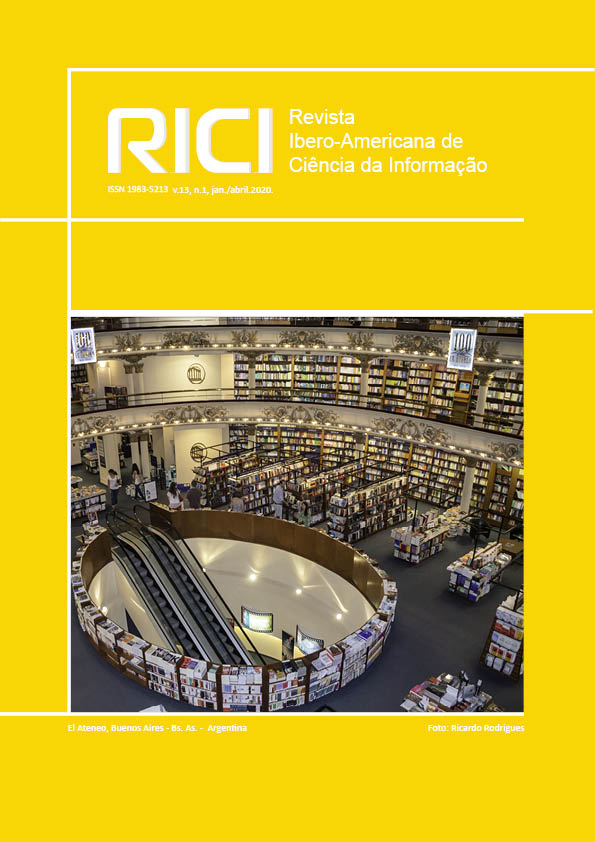Library mediation in the development of competences during supervised stage
DOI:
https://doi.org/10.26512/rici.v13.n1.2020.24444Keywords:
Librarian. Mediation. Supervised internship. Skills.Abstract
It presents results of research developed with the objective of analyzing the role of the librarian in the training of the Librarianship student during the supervised stage, as mediator in the development of competences that meet the demands of the labor market. This is research guided by the qualitative approach, with an exploratory research method. Data were collected using a questionnaire and interview script, and the data were analyzed using the content analysis technique with the establishment of categories. The results demonstrate that the librarian's participation as a technical advisor represents a key access to the market, being an active mediator of this market-academia pass. For this, the network that is formed in the stages should be considered as the cell that generates professional relationships that can contribute to the development or improvement of the skills of those who are already in the market and who will still reach, through the continuous exchange of experiences. We conclude that the supervised internship is a bridge between academy and society, and the librarian is the mediator, who can contribute both to the development of the technical skills inherent to the daily routines of the profession and to the behavioral competences, and that library mediation goes beyond the technical orientation, becoming a dialogical action between the subjects (technical advisor and trainee) that build a sedimented relationship in the exchange of experiences.
Downloads
References
ALMEIDA JÚNIOR. Mediação da informação e múltiplas linguagens. Pesquisa brasileira em Ciência da Informação, Brasília, v. 2, n. 1, p .89-103, jan./dez. 2009. Disponível em: http://inseer.ibict.br/ancib/index.php/tpbci/article/viewFile/17/39 Acesso em: 12 set. 2016.
BARBALHO, Célia Regina Simonetti. Gestão baseada nas competências. In: SEMINÁRIO NACIONAL DE BIBLIOTECAS UNIVERSITÁRIAS, 12., 2004, Recife, Anais eletrônicos... Recife: UFP, 2004.p. 3.
BARBALHO, Célia Regina Simonetti. Gestão baseada nas competências. Biblionline. João Pessoa, v. 10, n. 2, p. 97-107, 2014. Disponível em: http://periodicos.ufpb.br/ojs/index.php/biblio/article/view/16901/12484 Acesso em: 20 out. 2016.
BARDIN. Laurence. Análise de conteúdo. Lisboa: Edições 70, LDA, 1977.
BURIOLLA, Marta A. Feiten. O estágio supervisionado. 7. ed. São Paulo: Cortez, 2011.
BRASIL. Ministério da Educação. Diretrizes Curriculares Nacionais dos cursos de Filosofia, História, Geografia, Serviço Social, Comunicação Social, Ciências Sociais, Letras, Biblioteconomia, Arquivologia e Museologia, 2001. Disponível em: <http://portal.mec.gov.br/cne/arquivos/pdf/CES0492.pdf >. Acesso em: 12 abr. 2016.
FARIAS, Gabriela Belmont de; BELLUZZO, Regina Célia Baptista. Como desenvolver competência em informação mediada por modelagem conceitual-teórica: por uma aprendizagem significativa e criativa na educação. Londrina: ABECIN, 2015.
FARIAS, Maria Giovanna Guedes. Análise da produção, implementação e avaliação de um modelo de mediação da informação no contexto de uma comunidade urbana. 2014. 283 f. Tese (Doutorado) - Curso de Ciência da Informação, Instituto de Ciência da Informação, Universidade Federal da Bahia, Salvador, 2014. Disponível em: <http://repositorio.ufba.br/ri/handle/ri/16851 >. Acesso em: 4 ago. 2016.
FARIAS, Maria Giovanna Guedes. Mediação e competência em informação: proposições para a construção de um perfil de bibliotecário protagonista. InCID: Revista Ciência da Informação e Documentação, Ribeirão Preto, v. 6, n. 2, p. 106-125, set. 2015/fev. 2016, p.117.
FIGUEIREDO. Nice Menezes de. A modernidade das cinco leis de Ranganathan. 1992. Ciência da Informação, Brasília, v. 21, n. 3, p. 186-191, set./dez. 1992. Disponível em: <http://revista.ibict.br/ciinf/article/view/430 >. Acesso em: 22 out. 2016.
FREIRE, Paulo. Pedagogia do oprimido. 17. edição. Rio de Janeiro: Paz e terra, 1987.
GIL, Antonio Carlos. Métodos e técnicas de pesquisa social. São Paulo: Editora Atlas. 1999.
LEME. Rogério. Aplicação prática de gestão de pessoas: mapeamento, treinamento, seleção, avaliação, e mensuração de resultados de treinamento. Rio de Janeiro: Qualitymark, 2005, p.3-83.
MELLO, Priscilla; VIEIRA, Ronaldo. O bibliotecário como agente cultural. São Paulo: AGBOOK, 2012.
MINAYO, Maria Cecilia de Souza. O desafio da pesquisa social. In: DESLANDES, Suely, GOMES, Romeu, MINAYO, Maria Cecilia de Souza. Pesquisa social: teoria, método e criatividade. Petrópolis, RJ: Vozes, 2013, p. 9-27.
RANGANATHAN, S. R. Psicologia e natureza do trabalho dos usuários. In: A contribuição da psicologia para o estudo dos usuários da informação técnico cientifica. Organização e tradução de Hagar Espanha Gomes. Rio de Janeiro, Calunga, 1980. p. 31-42.
RICHARDSON, R. J. et al. Pesquisa social: métodos e técnicas. São Paulo: Atlas. 1999.
SILVA, Jonathas Luiz Carvalho; FARIAS, Maria Giovanna Guedes. Abordagens conceituais e aplicativas da mediação nos serviços de informação. InCID: Revista de Ciência da Informação e Documentação, Ribeirão Preto, v. 8, n. 2, p. 106-123, out. 2017. Disponível em: <https://www.revistas.usp.br/incid/article/view/122628 >. Acesso em: 20 nov. 2017.
TARGINO, M. das G. Olhares e fragmentos: cotidiano da biblioteconomia e ciência da informação. Teresina: EDUFPI, 2006.
UNIVERSIDADE FEDERAL DO CEARÁ. Departamento de Ciências da Informação. PP biblioteconomia_fortaleza.pdf. Disponível em: <http://www.ufc.br/ensino/cursos-de-graduacao/187-biblioteconomia-fortaleza >
Downloads
Published
How to Cite
Issue
Section
License
Copyright (c) 2020 Maria Josélia de Oliveira, Maria Giovanna Guedes Farias

This work is licensed under a Creative Commons Attribution 4.0 International License.
Copyright Notice
Authors who publish in this journal agree to the following terms:
- Authors retain copyright and grant the journal right of first publication with the work simultaneously licensed under the Creative Commons Attribution License 4.0, allowing the sharing of work and recognition of the work of authorship and initial publication in this journal.
- Authors are able to take on additional contracts separately, non-exclusive distribution of the version of the paper published in this journal (ex.: distribute to an institutional repository or publish as a book), with an acknowledgment of its initial publication in this journal.
- Authors are permitted and encouraged to distribute their work online (eg.: in institutional repositories or on their website) at any point before or during the editorial process, as it can lead to productive exchanges, as well as increase the impact and citation the published work.
















